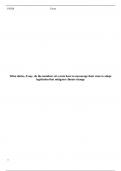PH338 Essay
What duties, if any, do the members of a state have to encourage their state to adopt
legislation that mitigates climate change
1
, PH338 Essay
Climate change, recognised by the United Nations as the significant variations in typical weather patterns over several
decades (United Nations, 2024), remains a highly contentious topic within various academic disciplines. As a critical
global issue (Hormio, 2023), considerations over the role of agents and methods in response to the anticipated risks
from climate change are paramount to supporting a just and sustainable future. This essay will contribute to the
existing discourse by evaluating the pragmatism of various responses and arguing that members within a state have a
duty to encourage their states to adopt legislation that mitigates climate change. The essay will first deconstruct the
broad notion of duty, dividing it between the political, moral and civic forms alongside establishing how effective
synergies between members and governments should propel cooperation among these duties. Following this, the essay
will introduce the first duty, positing that members within a state have a duty to politically participate in voting for
candidates that promote and support climate initiatives, integrating intergenerational justice as moral grounds to
support this. Further expanding on the discussion of political duty, the essay will propose that collective congregation
among members to publicly participate for demands over state action is a duty, underlining the comprehensive
advantages public participation holds in unifying and strengthening a collective stance in response to structural
injustice (Roberts, 2020). Concluding with a broadened perspective, the essay will argue that members within a state
have a duty to educate each other on climate change, providing an account of how adequate climate literacy underpins
the success of all the other duties and initiatives in encouraging state action.
Commencing with a brief isolated focus on duty and its connotations is a crucial starting point in providing a
philosophical foundation for this essay when later evaluating specific duties. According to Frazier's definition, to have
a duty entails subjecting to a 'binding, normative requirement, an imperative force that provides a reason for an action
that 'must be done' (Frazier, 2023). While the conception of duty from a state perspective towards climate change
remains clear-cut, engrained within the legal frameworks (Mayer, 2021), the question of whether members have a role
in encouraging these efforts is a complex concern, requiring a thorough breakdown of Frazier's broad definition into
the multiple types of duties propelling a sense of duty amongst members. One of these duties is a civic duty, a 'feeling
of responsibility towards the society or place in which you live' (Cambridge Dictionary, 2024), interpreted to some
extent as a requirement in exchange for the benefits received (Blakely, 2023). An alternative duty is moral, recognised
as a standard of good or bad behaviour (Cambridge Dictionary, 2024), in light of climate change, can often entail
values such as environmental stewardship and intergenerational justice (Welburn, 2014). Intersections between the
moral and civic forms often propel a sense of political duty, focused on the relationship between state and government
members (Dean et al., 2019) a significant duty in line with the essay's focus on legislation from the state for climate
action. The essay's firm stance in accepting duties among state members, whether civic, moral or political, emanates
from the synergistic dynamic between members and governments to propel state action for climate change. Notable
contributors to this discourse, Armstrong and Johnson, both support this within their literature, advocating for
government-imitated responses as more pivotal and pragmatic approaches to the climate issue (Roberts, 2020),
conscious of interdependencies between the state's action and duties amongst members. This deconstruction of duty
and its paramount role in addressing the global climate change crisis will supplement and develop later progressions
focusing on specific duties from state members.
2




